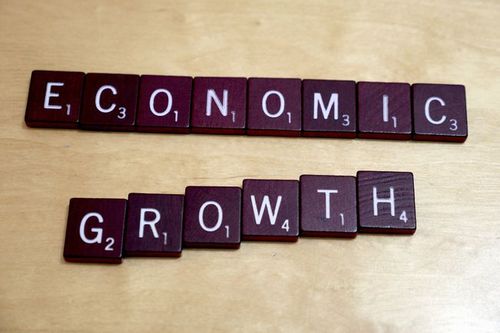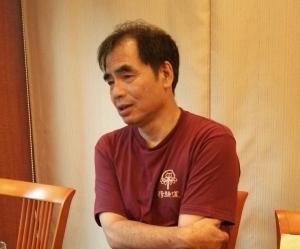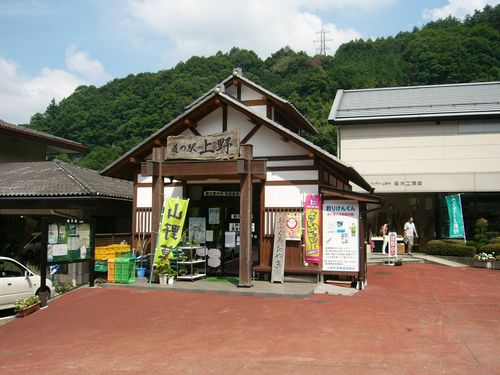November 18, 2014
What Kind of Economy Produces True Affluence? - Interview with Philosopher Takashi Uchiyama (Part 1)
Keywords: Newsletter Steady-State Economy
JFS Newsletter No.146 (October 2014)

Image by Simon Cunningham Some Rights Reserved.
The Institute for Studies in Happiness, Economy and Society, with JFS as its outreach partner, is undertaking a project, "What Is Economic Growth? -- Interviews with 100 People," in collaboration with Patagonia Japan. The project aims to encourage people to think about economic growth by asking specialists from many different fields to share their ideas about economic growth. Here we introduce the responses of the philosopher Takashi Uchiyama.
---------------------------------------
Edahiro: What is economic growth?
Uchiyama: I think that it simply means growth in GDP; I don't think there are any other definitions.

Takashi Uchiyama
Copyright ISHES All Rights Reserved.
As was the case in postwar Japan, when the process starts from a state of chaos after defeat in war, economic growth enables people to first satisfy their hunger, and then buy many more things and enjoy a feeling of affluence. When social infrastructure has been destroyed in the course of military defeat, the society must regain a certain level of stability. Numerically, this means growth in GDP. This process may also be described as, for example, "reconstruction of the society." But, once this stage is over, I wonder if economic growth and affluence are really connected.
Edahiro: Is economic growth a good thing?
Uchiyama: I do not think that capitalism can divorce itself from economic growth, because it is an economic system that creates constant market competition. To succeed in the market, companies have to continuously reduce prices. In this situation, if the pie, or GDP, does not grow, as companies try to lower prices and rationalize production, the result is a surplus of labor. The number of people out of work increases and wages decrease.
If this situation were to be left as is, it would be fatal to capitalism. Firstly because it would compromise social stability, and secondly because the increase in unemployed and low-wage workers would lead to a decrease in purchasing power, which would shrink the market.
Therefore, to overcome the effects of competition and ensure that society runs smoothly, GDP has to continuously grow. Otherwise, capitalism will destroy itself. So, for better or worse, the capitalist system requires economic growth.
Edahiro: In that case, for how long and to what extent will capitalism require economic growth?
Uchiyama: Capitalism is essentially a mechanism that has no choice but to seek perpetual economic growth. Of course, strains and distortions arise, but all of them have to be ignored for the mechanism to persist.
In order for capitalism to continue to develop indefinitely, it has to postulate an inexhaustible supply of natural resources. This argument has been under discussion since the days of the industrial revolution in Britain. Nature provides all the materials needed for everything that is produced, and so there must always be enough natural resources to ensure continuous growth in GDP.
It is quite obvious that natural resources are finite, but capitalism is based on an assumption that they are inexhaustible. Since the industrial revolution to the present time we have been acting as if we had an infinite supply of natural resources.
Anyone can see that this assumption is unreasonable. So, who is going to correct this? The answer used to be "future developments in science." The reasoning behind this answer was that scientific developments some time in the future will solve all the problems that have not been dealt with yet. This means simply throwing everything at future science, doesn't it?
Examples of "throwing everything at future science" are ongoing even today, nuclear power being one example. We all know that nuclear power generation produces radioactive waste. Even if nuclear plants cause no accidents, there is still the immense problem of what to do with the radioactive waste. The solution, again, is being thrown entirely on "future science."
Edahiro: This is the notion that future science and technology will solve the problems we are now facing, isn't it? I call this "the fantasy of the knight on white horse." Is it really possible for the economy to keep growing without limits?
Uchiyama: I believe we need a major shift. Let's take an example of Ueno, a village located in Gunma Prefecture, where I have a second home. When considering the economy on the level of Japan or the world, we have to accept the mechanism of capitalism.
However, on the village level, Ueno's economy simply seeks the well-being of the residents, not an increase in GDP. People simply hope to create a closed-loop, sustainable economic system by using resources available in the village, and to live without having to make excessive efforts to make ends meet. In Ueno, where local communities still remain solid, there is a sense of well-being among people who live in harmony with nature.
Thinking locally, we can imagine an economy requiring no growth. If residents have enough to live on in a closed-loop economy, their happiness depends on whether they can create a comfortable community.
In Ueno, people are rather integrally addressing two challenges: how to build a local economy and how to create their community. Most villagers say without hesitation that the economy is not everything. This is because they know they have another challenge, building a comfortable community.
By contrast, the mega-scale economy can only be grasped in the form of figures. For example, people might say that, without GDP growth, unemployment will increase by one million. Numerical solutions are sought and no reasonable answer can be conceived without GDP growth.
This suggests that people take completely different conceptual approaches to the mega-scale economy and to small-scale or local-level economies. Modern society has been moving on the mega-scale, but now more people are thinking about economy on a small scale.
In Japan, most regional areas formerly had their own local commercial zones. It was only later, during the high growth period, that all these economies started to move in step with the mega-scale economy.
Now we find that we had better return to local commercial zones wherever possible. Big cities such as Tokyo will find it difficult to return towards this economic style, but small scale communities such as Ueno can.
Even Ueno has to buy things from the outside and sell products to the outside. From the local economy viewpoint, we see that Ueno annually ships farm products equivalent to 100 million yen (about U.S.$926,000) while buying an approximately equivalent amount of goods from the outside.
In the process of exporting goods equivalent to 100 million yen from the village, local people also take into considering how to do this without damaging its natural environment. At present, they export farm produce such as mushrooms and some processed food while also profiting from tourism. They will be satisfied if they can earn enough money to buy what they need from the outside. If they can balance the budget in terms of their own local area, they are satisfied.
---------------------------------------
Ueno Village in Gunma Prefecture is an example of a locally-based economy that requires no growth. This case can contribute to the discussion about how beliefs in economic growth should be drastically changed.
In the next issue, we will present topics about the adverse effects of social change when society moves from being community-based to individual-based, and the relationship between a sustainable and happy society and the economy. Don't miss it!
(To be continued in the November issue.)
From "What Is Economic Growth? -- Interviews with 100 People," by the Institute for Studies in Happiness, Economy and Society

Image by Filler Some Rights Reserved.
Interview and Edit by Junko Edahiro
Related
"JFS Newsletter"
- 'Good Companies in Japan' (Article No.4): 'Eightfold Satisfaction' Management for Everyone's Happiness
- "Nai-Mono-Wa-Nai": Ama Town's Concept of Sufficiency and Message to the World
- 'Yumekaze' Wind Turbine Project Connects Metro Consumers and Regional Producers: Seikatsu Club Consumers' Co-operative
- Shaping Japan's Energy toward 2050 Participating in the Round Table for Studying Energy Situations
- 'Good Companies in Japan' (Article No.3): Seeking Ways to Develop Societal Contribution along with Core Businesses


